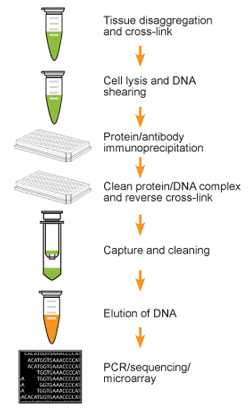EpiQuik Chromatin Immunoprecipitation Kit for Tissue
For immunoprecipitating chromatin specifically from tissue input samples via microplate format
Product Description
The EpiQuik™ Tissue Chromatin Immunoprecipitation (ChIP) Kit is a convenient package of tools that allows the experimenter to quickly perform chromatin immunoprecipitation (ChIP) from mammalian tissue. The kit is ready-to-use and provides all the essential components needed to carry out a successful ChIP experiment on tissue. The EpiQuik™ ChIP kits are suitable for combining the specificity of immunoprecipitation with qualitative and quantitative PCR, ChIP-Seq, and ChIP-on-chip. This kit has the following advantages:
- The fastest procedure available, which can be finished within 5 hours.
- The ChIP procedure has been drastically simplified -- extremely short and easy to follow.
- Strip microplate format makes the assay flexible: manual or high throughput.
- Columns for DNA purification are included, which save time and reduce labor.
- Compatible with all DNA amplification-based approaches.
- Achieves very reliable and consistent assay conditions.
See also a quick chart to compare ChIP kits.
Background Information
Protein-DNA interaction play a critical role for cellular functions such as signal transduction, gene transcription, chromosome segregation, DNA replication and recombination, and epigenetic silencing. Identifying the genetic targets of DNA binding proteins and knowing the mechanisms of protein-DNA interaction is important for understanding cellular process. Chromatin Immunoprecipitation (ChIP) offers an advantageous tool for studying protein-DNA interactions. Unlike other methods such as EMASA, DNA microarrays, and report gene assays, which analyze direct interactions between protein and DNA in vitro, ChIP can detect that a specific protein binds to the specific sequences of a gene in living cells.
Principle & Procedure

This ChIP kit includes all reagents required for carrying out a successful chromatin immunoprecipitation from mammalian tissue. Particularly, this kit includes a positive control antibody (RNA polymerase II), a negative control normal mouse IgG, and GAPDH primers that can be used as a positive control to demonstrate the efficacy of the kit reagents and protocol. RNA polymerase II is considered to be enriched in the GAPDH gene promoter that is expected to be undergoing transcription in most growing mammalian cells and can be immunoprecipitated by RNA polymerase II but not by normal mouse IgG. In this ChIP, cells are cross-linked with formaldehyde and chromatin is extracted. The chromatin is then sheared and added into the microwell immobilized with affinity antibodies. Cross-linked DNA is released from antibody-captured protein-DNA complex, reversed and purified through the specifically designed F-Spin Column. Eluted DNA can be used for various down-stream applications.
Starting Materials
Starting materials can include various tissue samples. In general, the input amount should be from 10 to 30 mg of tissue for each reaction.
Product Citations
- Riccardi F, Romano G, Licastro D, Pagani F (2024) Age-dependent regulation of ELP1 exon 20 splicing in Familial Dysautonomia by RNA Polymerase II kinetics and chromatin structure. PLoS One
- Marzullo M, Romano G, Pellacani C, Riccardi F, Ciapponi L, Feiguin F (2023) Su(var)3-9 mediates age-dependent increase in H3K9 methylation on TDP-43 promoter triggering neurodegeneration. Cell Death Discov
- Zhang Y, Du L, Yan J, Bai Q, Niu Q, Mo Y, Zhang Q, Nie J (2022) Prenatal benzo[a]pyrene exposure impairs hippocampal synaptic plasticity and cognitive function in SD rat offspring during adolescence and adulthood via HDAC2-mediated histone deacetylation. Ecotoxicol Environ Saf
- Chang C.H., Lee T.H. (2021) Hypothermal Effects on Expression of Regucalcin, A Calcium Binding Protein, in Livers of Seawater- and Fresh Water-Acclimated Milkfish, Chanos Chanos Fish Physiology & Biochemistry
- Han F, Yin L, Jiang X, Zhang X, Zhang N, Yang JT, Ouyang WM, Hao XL, Liu WB, Huang YS, Chen HQ, Gao F, Li ZT, Guo QN, Cao J, Liu JY (2021) Identification of SRY-box 30 as an age-related essential gatekeeper for male germ-cell meiosis and differentiation. Aging Cell
- Catalog Number
P-2003-1-EP - Supplier
EpigenTek - Size
- Shipping
Blue Ice

